|
Chesterfield, Virginia, September 23, 2016 – Bonazah Community Development of Africa; Board of Directors, today announced the hiring of a Teacher for After-School and Weekend Program for Government School Mbambe. The Board of Directors congratulates the final candidate who was selected to launch all educational endeavors sponsored by Sunny Village Foundation. The success of this program in GS Mbambe will enable the sponsor to continue sponsoring the project for many years to come and eventually lead to expansion to other primary schools in the area. This achievement underscores Bonazah Community’s commitment to continue to provide support to communities serving children from impoverished communities.
About Bonazah Community Development of Africa Founded in July 18, 2013, Bonazah Community Development of Africa has been involved in community development, since July, 2013. It is known for Teachers hiring program to primary schools, Women empowerment program, Scholarship Programs to underprivileged children, Support to Military Members and their Families. “Bonazah Community Development of Africa is position to continue to provide educational services to the most in need with it partnership with Sunny Village Foundation. We are thankful to provide education enhancement opportunity to the pupils of Government School Mbambe” added Benjamen A. Azah, President/CEO of BOCODA, INC. For more information about Bonazah Community Development of Africa, visit its website at www.bonazah.com.
0 Comments
Bonazah Community Development of Africa has 2 Part-Time Job Openings for After-School and Weekend Program for Government School Mbambe, Ngie Subdivision, North West Region; Cameroon. These openings are for the academic year 2016-17. Applicants must have the following qualifications: Qualifications and requirements
Competencies
Salary: Starting salary amount is negotiable and dependent on applicant’s qualifications. Schedule: Saturdays: Working hours are from 08:00 AM to 2 PM and for selected two weekdays after school program One hours each except for national and school holidays. Contact: Thank you for your interest. If you require any additional information please contact the Regional Manager-Cameroon, Ms. Minette, Phone: (237) 670-648-938 or (237) 666-995-899, and email: [email protected] Bonazah Community Development of Africa is committed to the principles of equal employment opportunity and is committed to making employment decisions based on merit. We are committed to complying with Federal, State and local laws providing equal employment opportunities, as well as all laws related to terms and conditions of employment. The organization desires to keep a work environment free of sexual harassment or discrimination based on race, religion, ethnicity, national origin, sexual orientation, physical or mental disability, marital status, age or any other status protected by Federal, State or local laws. 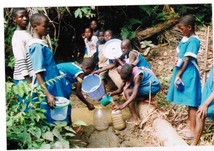 Government School Abichia Village Enhancement Initiative A Betterways Africa International (BAI) and Bonazah Community Development of Africa (BOCODA) Community Support Partnership Initiative BACKGROUND Following a request from the Abichia village community for organizational and financial and management support and assistance for the construction of minimal school facilities for its only primary school, Betterways Africa International, a non-profit organization based in Bamenda, Cameroon responded favorably. The Project beneficiary is Government School Abichia, Ngie Subdivision, in the North West Region, Cameroon. PROBLEM STATEMENT Abichia is a remote village in the Ngie subdivision in the North West Region of Cameroon in West Africa. The inhabitants of Abichia village are mostly subsistence peasant farmers, and are not able afford capital investment such as buildings for the school on their own. They people are peace-loving and hard-working community and are hardly reached by development opportunities. Despite Government efforts over the years, the schools infrastructure mainly consists of two recently constructed classrooms, and dilapidated mud and palm front huts. There is no portable water point for the school. See pictures attached. The recent efforts of the Government in constructing two new classrooms creates a positive context and paves the way for successful implementation this project to complete the revitalization of basic primary school facilities for the over 300 children and Abichia and neighboring villages. Overall Project Objective: The projects involve the construction and equipment of five classrooms, two toilets, and a portable water facility for Government School Abichia, over the next 5 years. Following initial preparations, BAI launched in partnership with the beneficiary village community and moral encouragement of the local area Andek Council in December 2015. This project will supplement the efforts of the Government which constructed two classrooms for the village in 2014, making a total of 6 classrooms and a shared office space for the teachers, a separate space for the Head Teacher, and a portable water point. The school facilities aim to give services to 300 primary school children from Abichia and neighboring villages. It will enhance access and quality of education for children in this remote, rural community, and increase the attendance rates. With a population of about 300 primary children of school age , the people who themselves expressed a desire for this project have been seeking for a prospective infrastructural face-lift of the school and are willing to invest their own time and effort for the construction. Current Status of the Project Following various preparatory initial resources provided by the Founder of BAI, the construction of two classrooms was launched in late 2015. Progress achieved included:
Given the forward-looking momentum created by the construction of two classrooms by the Government, this project seeks build to contribute further to the creation of:
Total estimated budget including (including contingency): The total budget estimate of entire project is about 35 millions frs CFA, (USD 70,000). The local beneficially will provide all manual labor for the project, therefore demonstrating their ownership and commitment to the education of their children. Partnership with Bonazah Community Development of Africa In January 2016, Bonazah Community Development of Africa (Bocoda Inc.) a non-profit organization based in the United States gained awareness about the Project and joined forces with the initiator, Betterways Africa International (BAI) for the process forward toward successful implementation of the next phases of the project. This vital partnership is expected to significantly boost efforts toward implementation of the project, notably through:
HOW YOU CAN HELP!
For further information about this project, please contact:
International: (1-315) 804-9491 Sustainability and Maintenance The project will seek to develop the capacities of the School Maintenance Committee to ensure permanent upkeep and maintenance of the facilities to be developed. This Committee will be made of all interested and resourceful parties, the school Head master, representatives of the Parent Teacher Association (PTA), the Chief of the Village and skilled parents. It will be responsible for and creating community awareness of school issues, fundraising, and conduct of maintenance work. Its composition and role will be finalized in consultation with the school. We at Bonazah Community Development of Africa wish you and your family Happy-Thanksgiving. Special thanks for your dedication, commitment and support over the past years.
While we celebrate this Thanksgiving with family and friends, Please pause for a moment and pray for world peace and to remember those who are proudly serving our country at home and abroad and are unable to spend time with loved ones. Warm Wishes Bonazah Community Development of Africa Leadership Team Today the Executive Director of Bonazah Community Development of Africa - Cameroon signed a partnership with FAPEFE Yaoundé Cameroon in the presence of our international volunteers (Chunxiao Sarah from China, Aafke from Holland, and Julia Mai Tran from Germany). The MOU is to strengthen relationship between the two organizations and develop strategies to reach out to the grassroots orphaned children by providing basic education needs, school fees supports, school uniforms, text books and exercise books to the less privileged Cameroonian Children. The events ended with a presentation of symbolic gift from BOCODA to the director of FAPEFE.
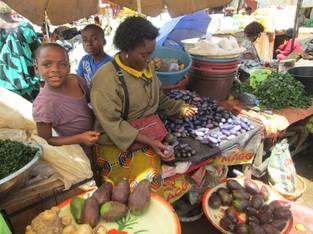 Mama Nkemasong rose is married with four (4) children and renting in Ntamulung, at age 45 she has been through a lot of challenges raising her kids and sending them to school. Her husband is a local market career with limited income to sustain all the children’s need, pay rents and take care of her bills. Over the years madam Rose has been struggling to do petit trading in order to raise income that can assist in sponsoring her children to school and also feeds the house. Unfortunately she has never been lucky as her children could not carry on with education as she and her husband intended due to the lack of capital to do petit trading. Coming in contact with Bonazah Community Development of Africa Cameroon, mama rose attended our four weeks business training alongside 10 others and thanks to your support she was awarded a financial support to start up a business on her own and sustained her family. Thanks to the support she has now started a petit trading selling pear, sweet yams, plums, and other food items at the Bamenda food markets. She hopes to expand her business in renting a space inside the market. With your continues support we can do more for this women and reduce extreme poverty in Africa, continue supporting our course and help the vulnerable. The woman is the center of economic growth and development, let’s join effort to empower them now. 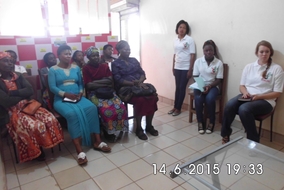 The Global Citizenship through Business and Education (GCTBE) is a program developed in 2014 with objectives to promote ongoing education and research in Cameroonian youth, Enhancing the understanding of economic development, foster global citizenship through business and education, develop, implement, and monitoring of microfinance schemes that will benefit the underserved; provide economic education to individuals with limited formal education; and other activities deemed mutually beneficial to both parties. The core value of the project to promote research amongst University Student (BOCODA social enterprise fellows) in the area of livelihood practices and micro enterprise development, On the other hand the project is developed to reach out to the community through a micro credit schemes supported and fully sponsored by BOCODA. The first phase of this project was launched in 2014 in partnership with the Bamenda University of Science and Technology (BUST). The collaboration brought in the provision of two selected BOCODA – BUST social enterprise fellows from BUST University and 15 market women as beneficiaries of the micro grant to improve on their businesses. The women beneficiaries were given grant support after the training and the Team under the supervision of BOCODA and BUST management monitored these women closely and the progress of their Business. The second phase was lunch in February 2015 characterized with different changes in the projects of 2014. After the evaluation of the 2014 project realization the New Executive Director organized several sensitization meeting with a new orientations and strengthening of the partnership with Bust. A series of meetings was held with the administration of BUST Universities to strengthen the partnership ties between BOCODA and BUST University. This meetings lead by the Team Leader of BOCODA. A total of 6 professional meetings were held with the Dean of studies and the vice chancellor of the University. The meetings helped to sensitize BUST on the new orientation and strategies to attain the objectives of the program for 2015. Bust university made a selection of two outstanding students to carry on the responsibility of 2015 program fellow. The two students Fonbah Junior Eric and Suh Nchang Tabitha were selected by name and presented to the administration of BOCODA for briefing which took place at the BOCODA head office Cameroon. In addition BOCODA was opportune to collaborate with a US Peace corps volunteer NOWELL TERA KATHLEEN who volunteered to join management team and support the realization with her own expertise. A project realization team was then set up by the executive director of BOCODA who took two training sessions to educate the entire team on the project and draw a road map on how to realize the program for the year. The Project team composed of: MBUH RENE NSUH - EXECUTIVE DIRECTOR of BOCODA AMBE MINETTE - BOCODA OFFICE MANAGER HARRIET - BOCODA OFFICE ADMINISTRATIVE ASSISTANT NOWELL TERA KATHLEEN - PEACE CORP VOLUNTEER FONBAH JUNIOR ERIC - 2015 MALE PROGRAM FELLOWS SUH NCHANG TABITHA - 2015 FEMALE PROGRAM FELLOWS IMMANUELA LUM CHE - 2014 FEMALE PROGRAM FELLOWS GIBRILE - 2014 MALE PROGRAM FELLOWS Identification and Selection of Women Beneficiaries. A team headed by the office manager went to the field and identified some 23 women beneficiaries that were closely analyzed and the following 10 were further selected to take part in the training: 1. SUH NGWE 2. BIH ANISTER CHE 3. KOBBI PAULINE ANGUM 4. NKEMASONG ROSE NKAFU 5. ANITA MAGHA NWANA 6. NDIFOR FLORENCE ATEH 7. SIRRI MAFOR NDIFOR 8. TANGWAM ANGELINE ANDINE 9. COMFORT NKENCHAP 10. NGWE GRACE Training of Beneficiaries. A two weeks training was organized composed of 2 hours a day and two days a week making a total of 8 hours training session on business management and business development. Headed by the Peace Corp Volunteer the ten women all took part in the training with no absents recorded nor late coming recorded. This attitude of the women and their contributions during the training session motivated the team to immediately go in for the selection of another set beneficiaries. To help support our efforts, please make a donation and share with family and friends. Thank you for the opportunity to introduce you to Bonazah Community Development of Africa, Inc. (BOCODA) a 501 (c) (3) 170 Public Charity registered in the United States and to request your support for our campaign to support disadvantage children in Africa.
BOCODA is a non-for profit organization founded on July 18, 2013 by Benjamen Azah. As a native of Africa, he knows from personal experience the impact poverty and lack of services has on the citizens. He began BOCODA with his own money as a way to provide humanitarian aid through increased access to promoting educational programs encouraging student retention in primary and secondary schools, and stimulation of rural economy through microfinance programs. The mission of BOCODA is to leverage educational and financial resources in order to increase and improve the way of life for underprivileged youth in developing nations. Benjamen Azah has returned to his hometown in the Ngie area of Cameroon, Africa to initiate projects in which the underserved are afforded education, healthcare, and financial independence. VISION Bonazah imagines a world where every underserved child receives quality education in other to thrive in their communities, nation, and the world at large. One of our goal is to give the underserved children's the opportunity to make a difference in their life by working with local schools, rural councils and orphanages to create a safe, loving and nurturing environment by teaching these children a good traditional values that enriches cultural beliefs and customs enabling them to grow up and be great asset to their community; healthy, educated and well-balance adults so they can contribute in the future development of their hometown. The least we can do is by supporting them to achieve the very basic of human rights which is to enable them to graduate from primary and secondary school through our education empowerment program. Education is like food and shelter. It is considered basic to one's life. While food is for health and shelter for the body, education is for the mind. Education enhances one's knowledge and as the saying goes; knowledge is power. However, power that a person possess will be dependent on how an individual uses it. This is where the education should be given importance. As education is geared towards individual development, such development should eventually transform into social development. It is one important policy that a state must promote, as education is the only means to understand its history, culture and to some extent their religion. Education is the only means to unite a country, a people as nation. Education can help people alleviate their lives from poverty. People who are educated have better chances of being employed thus, they can earn for their family and themselves. If People have better and stable jobs, there are chances that they will not get involved with crimes which some of them desperately do because they lack money. Education help people to have a better sense of what to do with the world thus they also tend not to live their lives only for themselves but also for other people in the world. Causes and foundations which involve resolving issues in depressed places and other problem areas in the world are run mostly by people who know how such things work. Some even do their best to educate people from such situations in order to help them stand up on their own and live better lives. We believe that Education can be the best solution to all the world’s problems. As an organization we do our part in helping the government and not so fortunate people in achieving their dreams by letting them know that EDUCATION IS A RIGHT. "Every government degenerates when trusted to the rulers of the people alone. The people themselves, therefore, are its only safe depositories. And to render even them safe, their minds must be improved to a certain degree." --Thomas Jefferson We believe in the formal education system and also understand that vocational training is a form of education which can be very important in job creation. Education is a life-long process. Gandhi, who was a great educationist, laid great stress on the usefulness of education. He was of the opinion that children should be taught crafts like carpentry, tailoring, masonry, iron smithy, weaving, etc., with which they can earn a living. Today we call all this vocational training. The importance of vocational training cannot be over emphasizing as in itself demands learning in practical form. By supporting less privilege communities out of extreme poverty Bonazah finds it important to support the informal sector through vocational training. The Education Program offers more than just a classroom learning environment. It fully invests in student development, providing mentorship in cultural and traditional values, counseling, tutoring, career panels, study skills and community service. Bonazah's commitment is to fully invest in providing for underprivileged children, the educational services that can transformed and enriched them with mentorship in cultural and traditional values, counseling, tutoring. Career panel, developmental skills and community services volunteers-ship Bonazah supports the training of education practitioners including teachers, teacher trainers and government education officers. We trained teachers on making resources, multi-grade teaching and using learner-centered teaching strategies such as group discussion, games, peer support, effective seating arrangements and working with children with special needs and/or learning difficulties. We also Education managers in school leadership, accountability, planning and budgeting, and how to engage communities in school activities. In Tanzania, a quality education assessment tool was developed and used by head teachers to review their school’s performance against governance, budgets, the role of senior management teams, quality of teaching and learning, curriculum delivery and inclusion. We focuses on implementing new education strategies, which emphasize the need for quality primary and basic education and community engagement for children’s education especially girls’ enrolment and retention. We develop strategies to strengthen cooperation with other development agencies and CSOs to increase influence on education policies and their implementation. Program will continue to scale up work on improving teaching and education management, so more quality education services are available for the most disadvantaged. Universal primary education was one of the main article in the millennium development goals (MDG), however according to the 2013 MDG report Most countries have achieved universal primary enrolment—rates of 90 per cent or higher—so the continent as a whole is expected to achieve Goal 2. Low completion and high grade repetition remain a challenge, however, as one in three students drop out. Reasons include late entry, poverty, poor quality of education and a lack of awareness of education’s importance. It is worth noting that due to lack of finance, shelter, most orphan and poor children cannot access primary education and thus have no encouragement to access education. Most of these street children, orphans in Africa are homeless living without control and guardians, a majority are orphans by AIDS, 17.8 million children under 18 have been orphaned by AIDS and that this will rise to 25 million by 2015. Around 15.1 million or 85 percent of these children live in sub-Saharan Africa. In some countries which are badly affected by the epidemic, a large percentage of all orphaned children - for example 74 percent in Zimbabwe and 63 percent in South Africa - are orphaned due to AIDS. In some countries, a larger proportion of orphans have lost their parents to AIDS than to any other cause of death - meaning that, were it not for the HIV epidemic, these children would not have been orphaned. TARGET OF THE PROJECT 1. Street children 2. Children orphaned by HIV/AIDS 3. Poor complete orphans 4. Extremely poor homes in sub-Sahara Africa STEPS TO TAKE Preparation of projects materials with specifications on target beneficiaries Collaboration with local community leaders to identify targets beneficiaries Identification and registration process Mobilization of recourses and support to targeted beneficiaries Provide assistance to all beneficiaries Ensure proper dissemination of assistance to direct beneficiaries Monitoring of beneficiaries improvements Evaluation and reporting for continuation and sustainability. EXPECTED RESULTS More children gain access to education in Africa The gap between the less privilege and the privilege is bridge through universal access to education Your gift can help provide quality education to those who currently lack access to education, thereby creating lives-saving opportunities for disadvantage children who might otherwise die without your support. We hope you will partner with us to provide hope, health, and a brighter future. Thank you for your time and contribution. Sincerely, Bonazah Community Development of Africa Team We have come to that time of the year again that we are requesting your support as we kick start this year donation drive “Action 2015 #BOCODA”. The Management Team would like to thanks all who donated last year and helped us reach our goal of $10,404.00. The money raised was put to several good uses. BOCODA’s activities are geared towards sustainable livelihood and poverty alleviation, notwithstanding we are concerned about the sustainability of our environment. We target grassroots initiatives and responsive programs in our activities realization. Some of our activities carried out so far are:
Thank You. Bonazah Community Development of Africa Team Bonazah Community Development of Africa (BOCODA) is A non-profit charity corporation created for the purpose of providing Humanitarian charity support, promoting educational programs and promoting sustainable livelihood initiative amongst the less privilege in African communities.
In the 21st century most Africa countries still records one of the lowest development rate and highest poverty level in the world, with a world’s population of over 7 billion, 805 million people (one in nine people) in the world – do not have enough to eat. 98% of the world’s undernourished people live in developing countries with a total of 214 million people coming from the Sub-Sahara Africa. Statistics from the world hunger projects further states that A third of all childhood death in sub-Saharan Africa is caused by hunger while 66 million primary school-age children attend classes hungry across the developing world, with 23 million in Africa alone. Despite Africa’s relatively strong economic growth performance over the past decade, many countries in the continent are grappling with several development challenges ranging from food insecurity, high unemployment, poverty and inequality, to commodity dependence, lack of economic transformation, environmental degradation, and low integration of the continent in the global economy. Since the dawn of the new millennium, African Governments and the international community have adopted various initiatives aimed at addressing these development challenges and improving living conditions on the continent. At the continental level, African Heads of State and Government adopted the New Partnership for Africa’s Development (NEPAD), which emphasizes African ownership of the development process and outcome, and calls for interventions in the following priority areas: agriculture and food security, regional integration and infrastructure, climate change and environment, human development, economic governance, and capacity development and women empowerment. At the international level, world leaders adopted the Millennium Development Goals (MDGs) which called for, among others, a halving of the proportion of people living in poverty by 2015. There are also ongoing efforts by the international community to eliminate and finalize the broad contours of the post-2015 development agenda, within the framework of sustainable development. While Africa has made some progress in achieving the goals set out in existing development frameworks, overall the continent is yet to realize the broad vision set out in these initiatives. For example, out of the eight MDGs, the continent is on track to achieve only three goals by the 2015 deadline, namely: achieving universal primary education (MDG 2), promoting gender equality and empowering women (MDG 3), and combating HIV/AIDS, tuberculosis and other diseases (MDG 6). Furthermore, the continent is still grappling with the problem of extreme hunger and poverty, and unemployment and inequality have increased over the past decade (United Nations Economic Commission for Africa (ECA) et al., 2013). These findings, based on analysis of macroeconomic data, have also been corroborated by the results of recent surveys. For example, a survey by Afro barometer conducted in 34 African countries between October 2011 and June 2013 indicates that poverty rates in sub-Saharan Africa have gone down but that the number of people in poverty has increased despite a decade of relatively high growth. Reversing this trend is a challenge that African policymakers have to address effectively in the short to medium term to enhance the likelihood of achieving the African Union’s vision of an integrated, prosperous and peaceful Africa. All this cannot be achieves without the help of the civil society and international partners. BOCODA in its vision believes that Africa needs the efforts of its people to grow the development process of its continents, for that reason BOCODA was created to reach out to the local grassroots inhabitants in Africa and empowered them to contribute to the development of Africa. In our analyses we narrowed down our interventions to four program areas that will effectively initiate community participation to both political, economic and environment growth and thereby reducing poverty. Our areas of interventions are: Educational promotion Livelihood promotion Environmental sustainability Basic needs support program |
AuthorBonazah Community Development of Africa (BOCODA INC) provides support, educate, and advise in order to ensure fair and equitable Archives
August 2019
Categories |

|
|
|
Our Mission Bonazah leverages educational and financial resources to increase and improve the life options for underserved youth in developing nations
|
Bonazah Community Development of Africa is organized for exclusively religious, charitable, educational and scientific purposes within the meaning of Section 501(c)(3) of the Internal Revenue Code of 1986 or the corresponding provision of any future United States Internal Revenue Law, including, for such purposes, the making of distribution to organizations that qualify as exempt organization under said Section 501(c)(3) of the Internal Revenue Code of 1986. The corporation provide charitable giving and direct services in support of education throughout the globe
|
|
Contact Us
|
Virginia - United States 5600 Gatebridge Road 23234, Email: [email protected] Phone: U.S. Customers (1-877) 998-6999 International Customers: (1-804) 454-4444 |
Mailing: Bonazah Community Development of Africa, Inc. Post Office Box 917 Fort Drum, New York 13602 New York: (1-315) 804-9491 |
Bamenda - Cameroon Hospital Roundabout Email: [email protected] Phone: (237) 673-102-018 Phone: (237) 673-102-018 |
© 2024 Bonazah Community Development of Africa, Inc. All Rights Reserved.
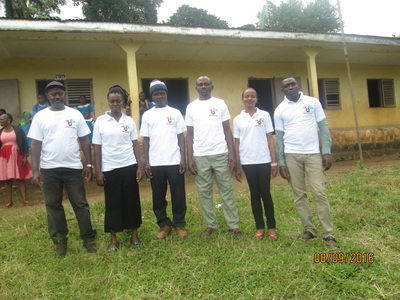
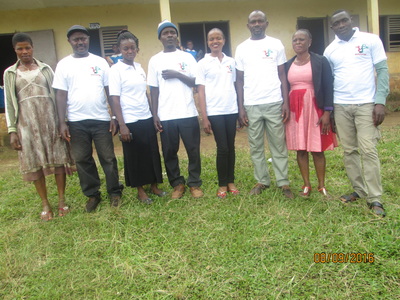
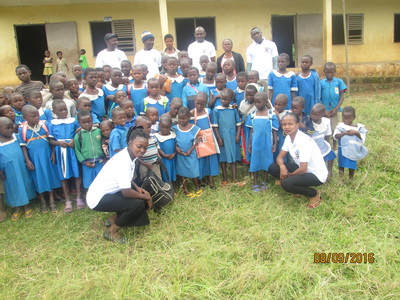
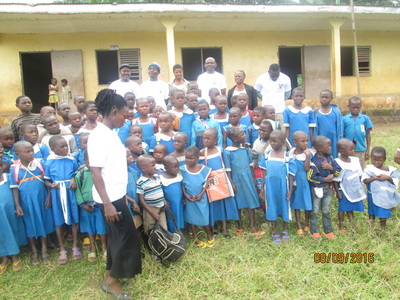

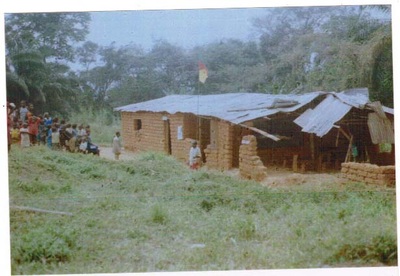
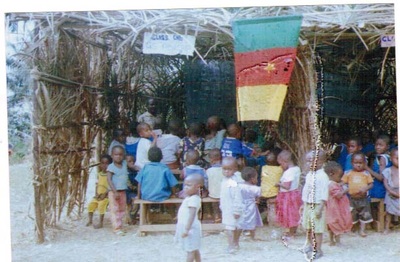
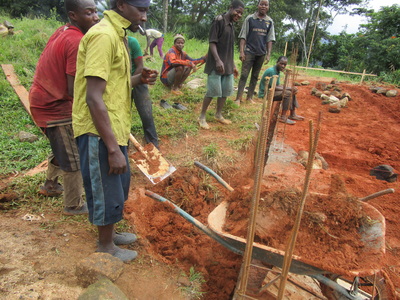
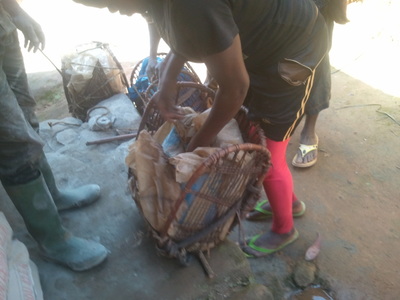
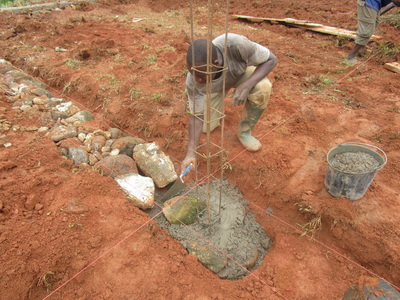
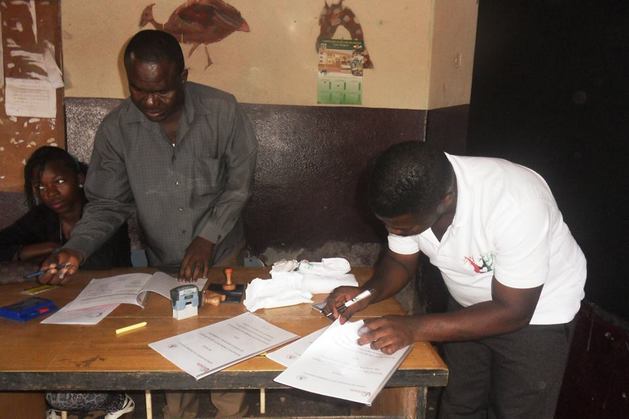
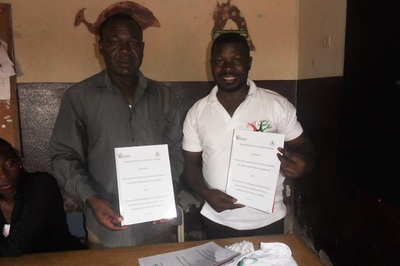
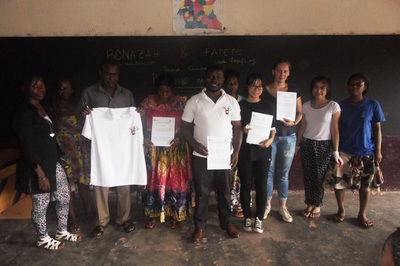
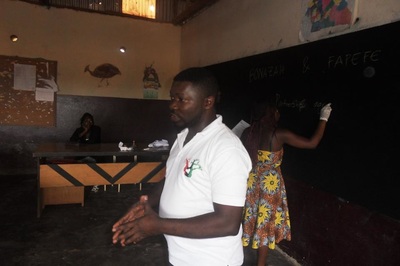
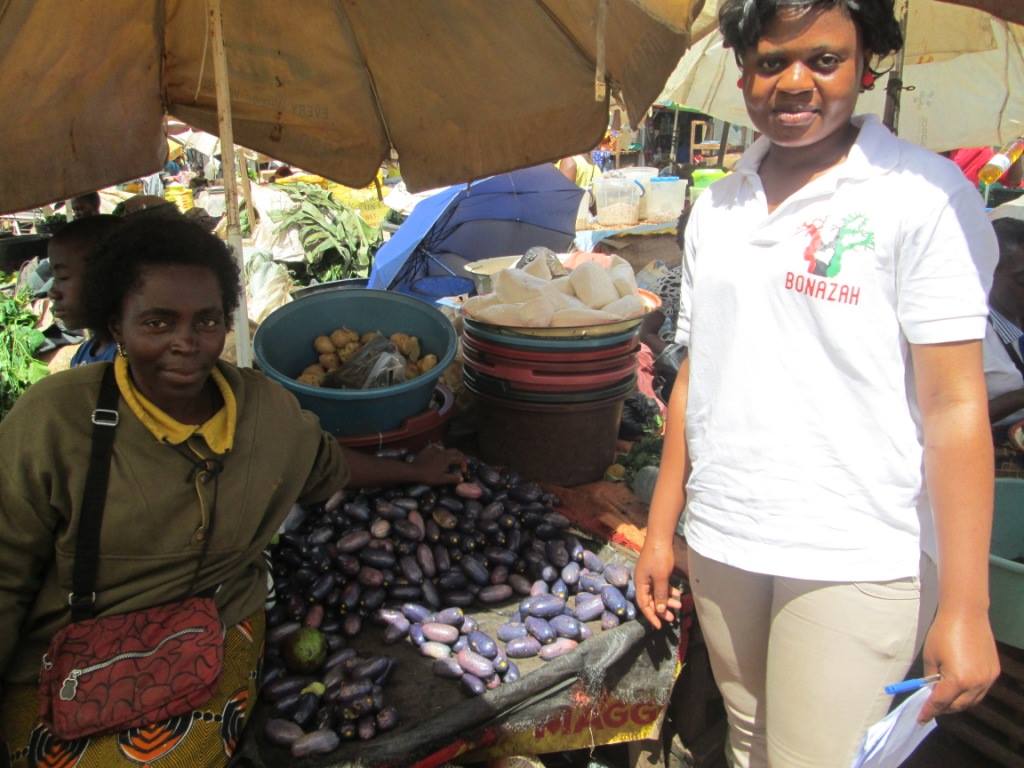
 RSS Feed
RSS Feed